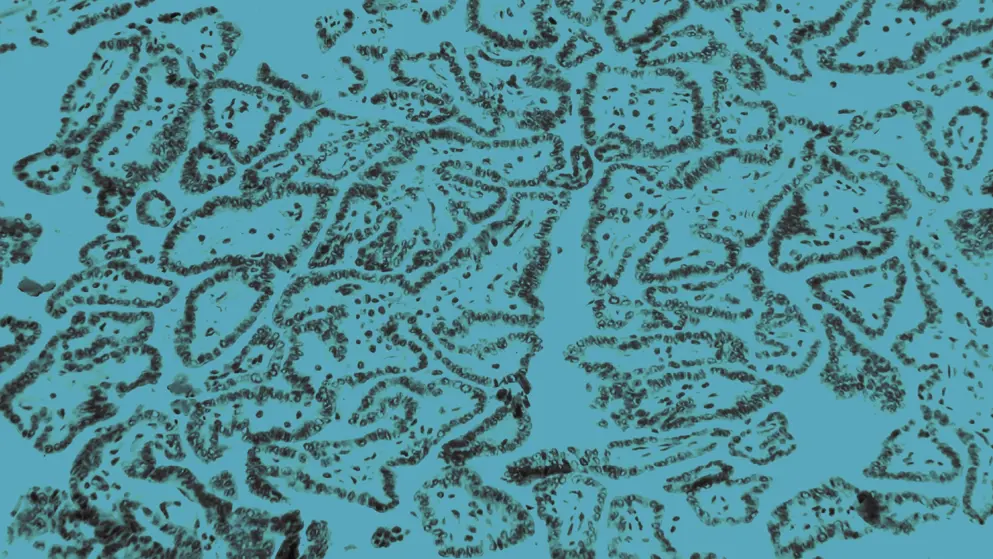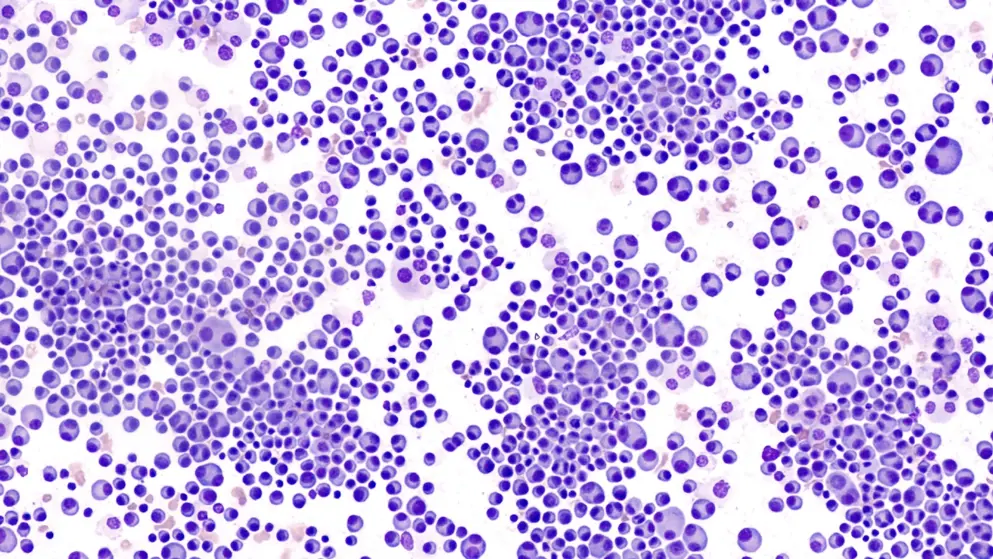
Thyroid Cancer
Thyroid cancer
What is thyroid cancer?
Thyroid cancer, also referred to as cancer of the thyroid or cancer of the thyroid gland, is a rare cancer affecting the small hormone-producing gland at the back of the neck. Thyroid cancer is most common in women in their 30s and those over 60. Symptoms of thyroid cancer include a painless lump, swelling or swollen glands on the neck, unexplained hoarseness and/or sore throat that does not get better, and difficulty swallowing (dysphagia). Thyroid cancer can be caused by other thyroid conditions, such as thyroiditis or goiter. Some other risk factors for thyroid cancer include family history of thyroid cancer, radiation exposure, obesity, acromegaly, and a bowel condition called familial adenomatous polyposis (FAP). An overactive thyroid or underactive thyroid does not cause thyroid cancer1.
What are the different types of thyroid cancer?
There are five different subtypes of thyroid cancer which originate in one of the two types of thyroid cell; follicular cells, which produce thyroid hormones that regulate the body’s metabolism, and parafollicular cells, or neuroendocrine C cells, which regulate calcium levels2.
Types of follicular thyroid cancer
Thyroid cancers that are derived from follicular cells include papillary carcinoma, follicular carcinoma and Hurthle cell cancer. These are differentiated thyroid cancers, and together account for 95% of all thyroid cancers. Papillary cancer accounts for 80% of differentiated thyroid cancers, making it the most common type of differentiated thyroid cancer, and it carries the best prognosis. Follicular carcinoma and Hurthle cancer are rarer but more high-risk with a greater tendency to metastasise, particularly to lungs and bones3. In general, differentiated thyroid cancers are usually easier to treat than other types of thyroid cancer1. Anaplastic thyroid cancer, or anaplastic thyroid carcinoma, is also derived from follicular cells but is an undifferentiated thyroid cancer3. Anaplastic thyroid cancer is particularly rare (<1%), and due to its aggressive nature and resistance to cancer treatments confers a median survival of only six months4.
Types of parafollicular thyroid cancer
Medullary thyroid carcinoma is the only type of thyroid cancer that is derived from parafollicular cells, accounting for 3–9% of all thyroid cancers. Like anaplastic thyroid cancer, medullary thyroid cancers are more aggressive than differentiated thyroid cancers and around 75% of patients with palpable thyroid nodules have metastasis in the cervical lymph nodes at surgery5. Mutations in the RET proto-oncogene, which can either be sporadic or inherited, are responsible for most cases of medullary thyroid cancer3. The RET proto-oncogene encodes the RET receptor tyrosine kinase, initiating a downstream signalling cascade effecting cell survival, differentiation and proliferation6. Median 5–year survival for medullary thyroid cancer is 70% and 75% for men and women respectively, which is relatively lower than the 5–year survival rate of differentiated thyroid cancers7. Thus, genetic screening of the RET gene is important for diagnosis, prognosis and treatment decisions for medullary thyroid cancer6.
Thyroid cancer treatments
Treatment for thyroid cancer depends on the type of thyroid cancer. Treatment for differentiated thyroid cancer includes surgical approaches, including lobectomy, complete thyroidectomy and lymph node dissection. Post-operative treatment for thyroid cancer includes radioiodine ablation, thyroid stimulating hormone (TSH) suppression, or both. Radioiodine can also be used as an adjuvant treatment for thyroid cancer. Unlike differentiated thyroid cancers, medullary thyroid cancer can be treated surgically only, followed by thyroid hormone replacement and active surveillance using ultrasonography and thyroid tumour markers. However, most patients with clinically apparent nodal metastases at diagnosis do not achieve undetectable tumour markers3.
Targeted treatments for thyroid cancer
Despite traditional approaches, 15–20% of thyroid cancers become radioiodine refractory (RAI-R), and 30% of medullary cancers are treated unsuccessfully8. However, there are now a variety of targeted thyroid cancer treatments, namely tyrosine kinase inhibitors (TKIs). Almost all TKIs used for treatment of thyroid cancers are multitarget drugs called multikinase inhibitors; used for papillary or follicular thyroid cancer patients who are unresponsive to radioiodine treatment, or for medullary thyroid cancers. RET inhibitors can be used for papillary, follicular, medullary and anaplastic cancers that harbour RET proto-oncogene mutations where radioiodine treatment is not an option. Neurotrophic tyrosine receptor kinase (NTRK) inhibitors can also be used for the small proportion of thyroid cancers that have NTRK fusion-driven mutations, causing changes in the TRK proteins that regulate cell signalling and functioning in healthy tissues8. There are many clinical trials underway investigating targeted thyroid cancer treatments9.
Developed by EPG Health for Medthority, independently of any sponsor.
ASCO 2024 A high-level overview
From ASCO 2024, read Dr Ben Gallarda’s overview of ASCO’s commitment to palliative care, artificial intelligence, and coordination with organizations.
Symposium on refractory multiple myeloma, COMy 2023
Watch our expert panel discussion on the management of relapsed and refractory multiple myeloma (RRMM) in older and frail adults.
How can poor-quality clinical trials impact clinical decision-making?
Explore why a cautious approach is warranted when interpreting trial results.
Related news and insights
Guidelines
References
- NHS (2019). Available at: https://www.nhs.uk/conditions/thyroid-cancer/ (Accessed June 2021).
- Khan YS, Farhana A (2021). Thyroid gland. In: StatPearls [Internet]. Available at: https://www.ncbi.nlm.nih.gov/books/NBK551659/ - :~:text=Thyroid%20cancer%3A%20Thyroid%20carcinomas%20arise,compression%2C%20displaces%20the%20adjacent%20structures. (Accessed June 2021).
- Cabanillas ME, McFadden DG, Durante C. Thyroid cancer. Lancet. 2016;388:2783–2759.
- Shikha S, Tulla K, Maker AV, Burman KD, Prabhakar BS. Therapeutic advances in anaplastic thyroid cancer: a current perspective. Molecular Cancer. 2018;17:1–14.
- Moley JF. Medullary Thyroid Carcinoma: Management of Lymph Node Metastases. J Natl Compr Canc Netw. 2010;8:549–556.
- Taccaliti A, Silvetti F, Palmonella G, Boscaro M. Genetic Alterations in Medullary Thyroid Cancer: Diagnostic and Prognostic Markers. Curr Genomics. 2011;12:618–625.
- Zhou X, Zheng Z, Chen C, Zhao B, Cao H, Li T et al. Clinical characteristics and prognostic factors of Hurthle cell carcinoma: a population based study. BMC Cancer. 2020;20:1–9.
- Solomon JP, Benayed R, Hechtman JF, Ladanyi M. Identifying patients with NTRK fusion cancer. Ann Oncol. 2019;30:816–822.
- Viola D, Valerio L, Molinaro E, Agate L, Bottici V, Biagini A et al. Treatment of advanced thyroid cancer with targeted therapies: ten years of experience. Endocrine-Related Cancer. 2016;23:185–205.






